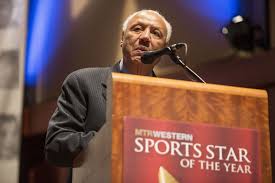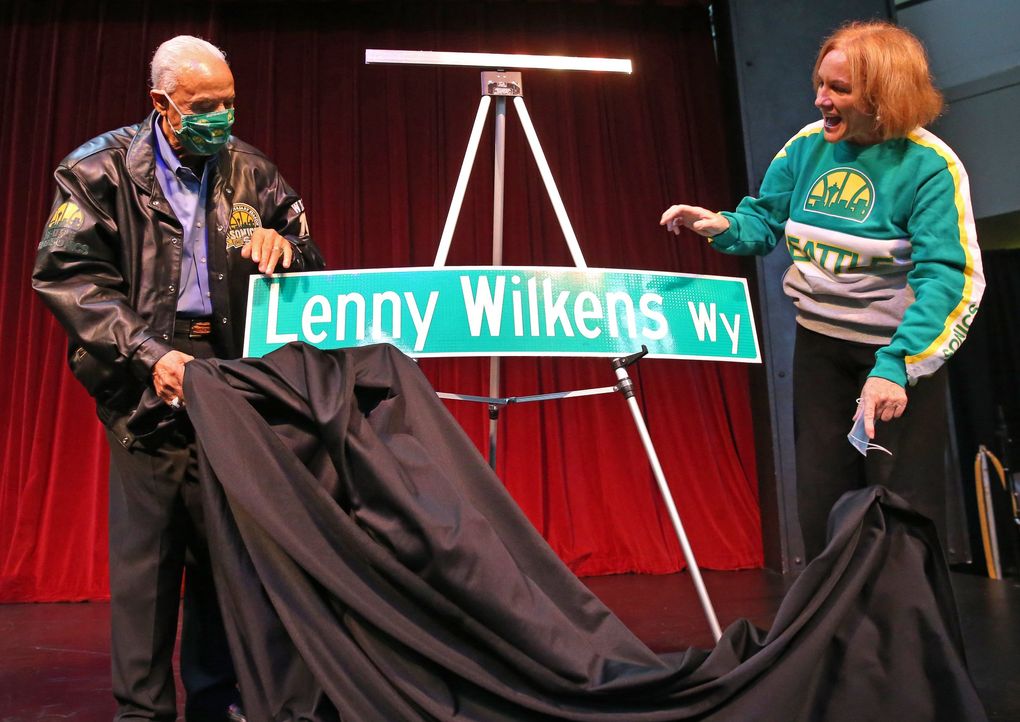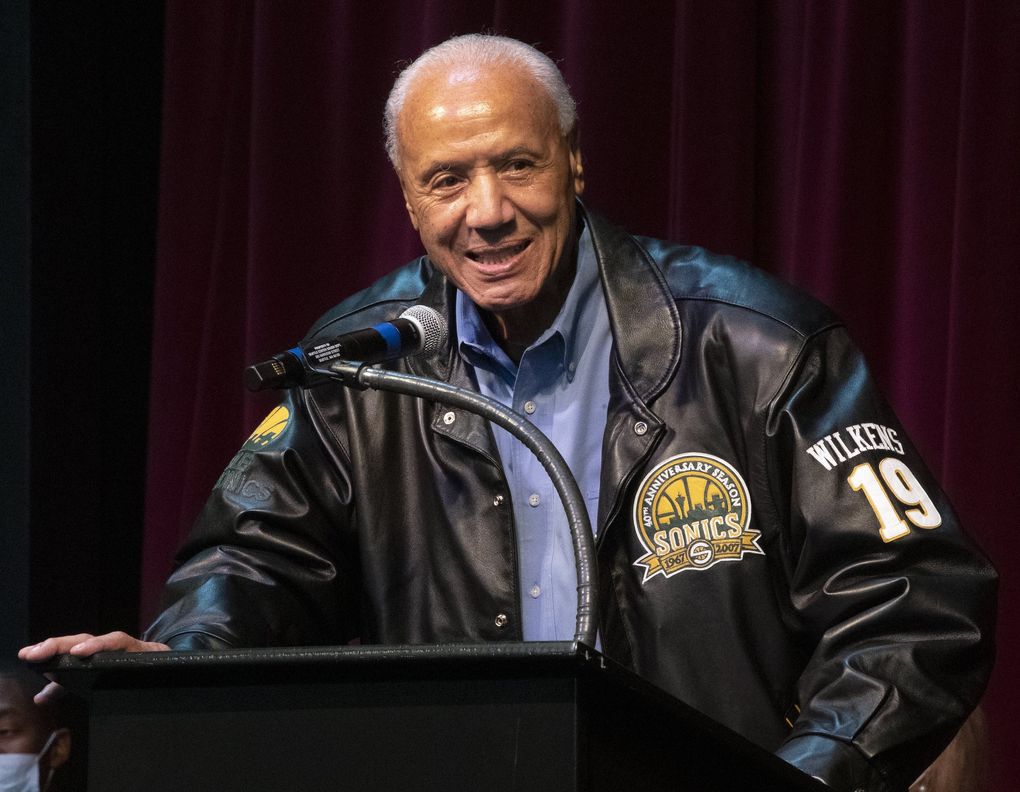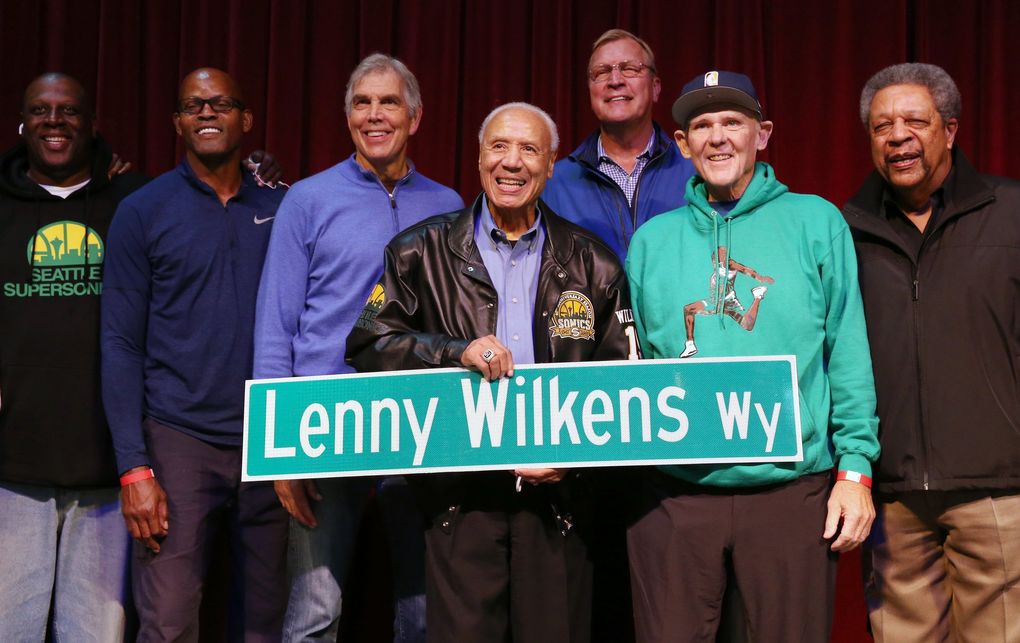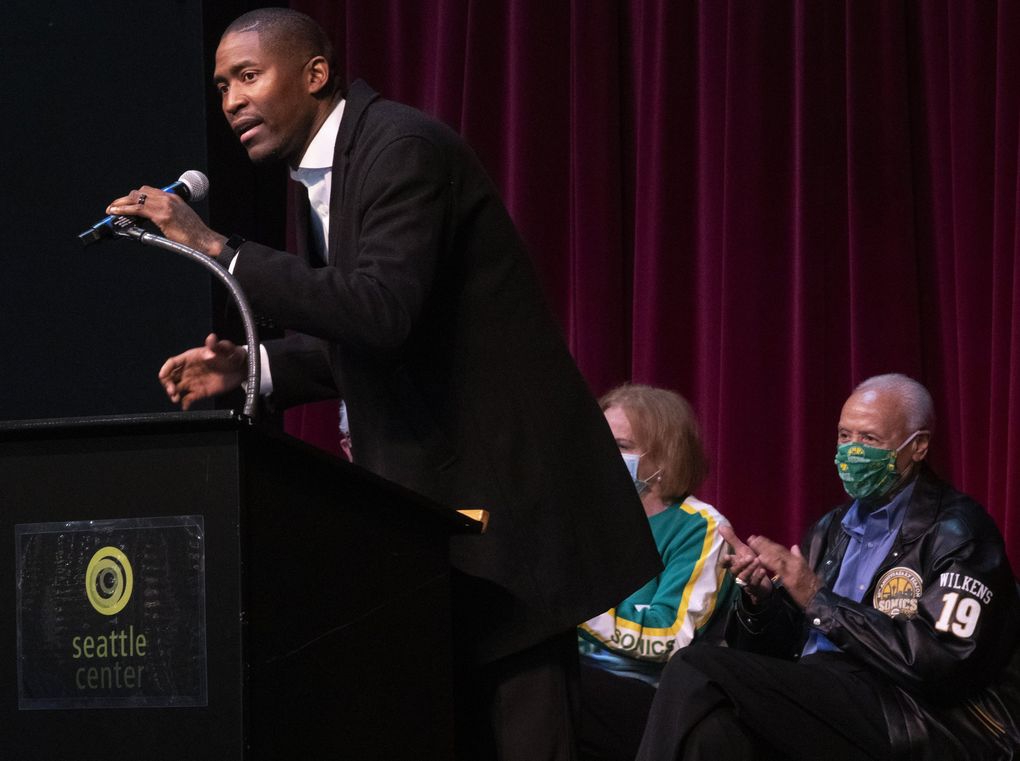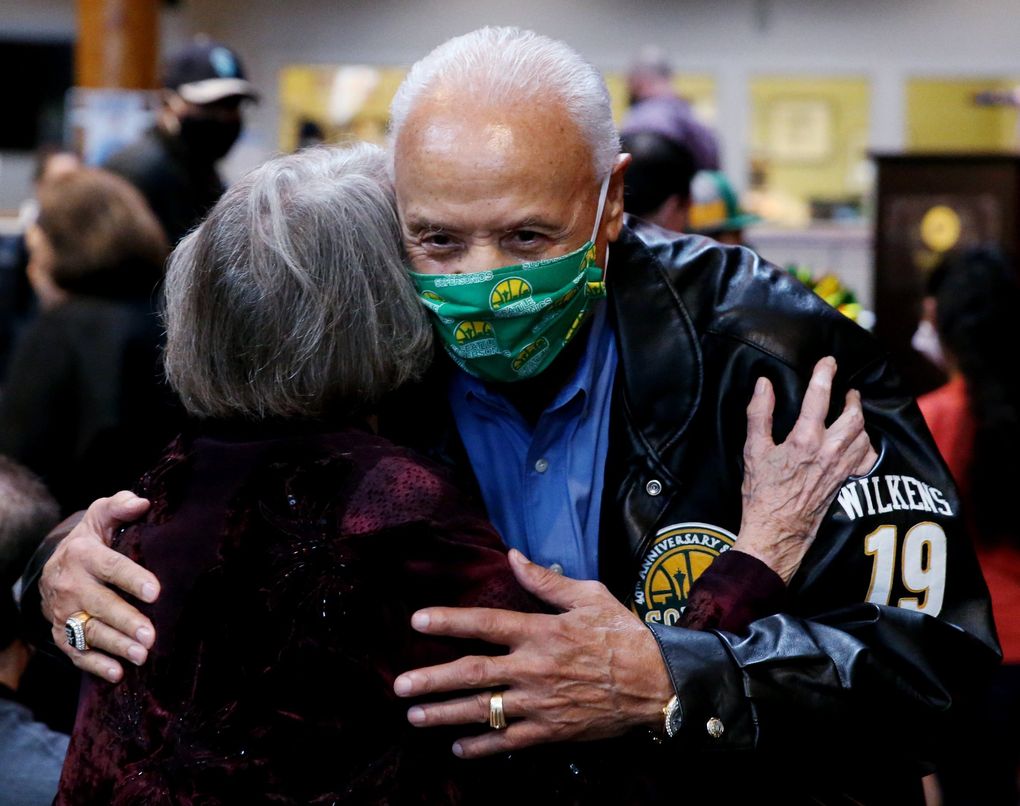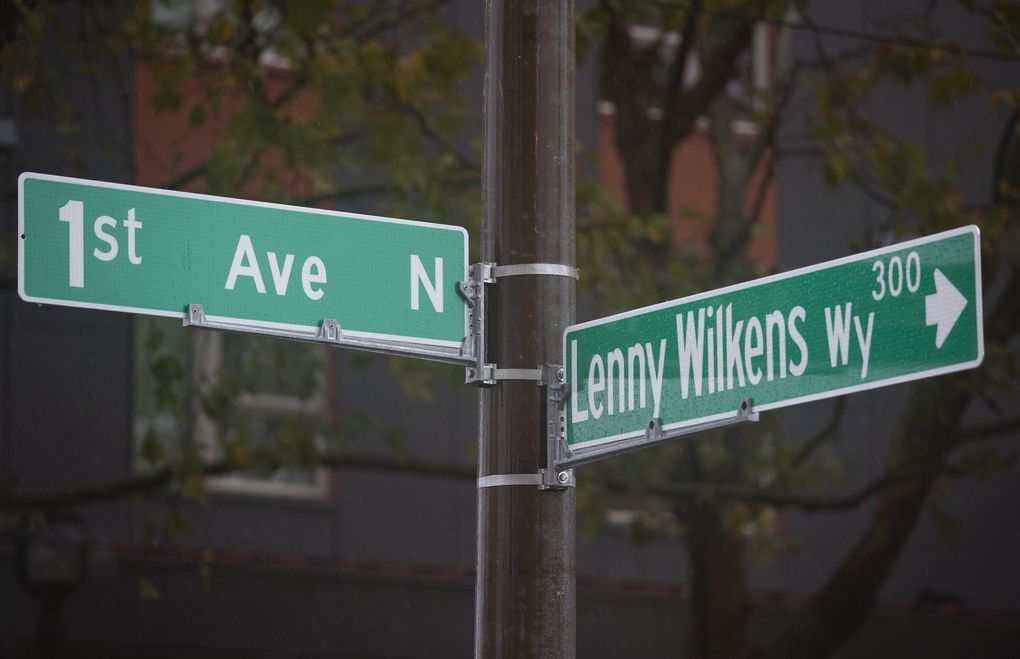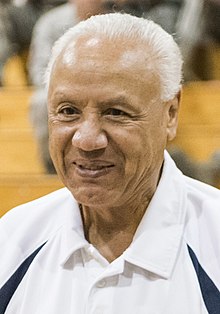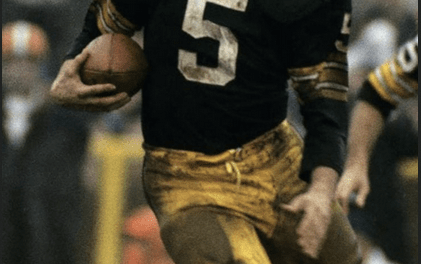Seattle’s Lenny Wilkens Way is a fitting tribute for ‘the foundation of Sonics basketball’
Lenny Wilkens officially had a Seattle street named for him Thursday, which is only fitting for a guy who once owned the town. And who will always have a treasured place in its collective heart, one that goes far beyond a stretch of pavement.
Lenny Wilkens Way, formerly Thomas Street, runs next to Climate Pledge Arena, which is a much fancier incarnation of the building where Wilkens ruled the hardwood as a Sonics player and coach. The 1979 NBA title remains a galvanizing event in the history of Seattle sports.
“Lenny Wilkens is a local hero for his years on the court as a player & coach for #SeattleSonics as well as his philanthropy & countless contributions to our community off the court. I am incredibly proud to rename Thomas Street as #LennyWilkensWay in honor of one of the greats,” Durkan tweeted.
“The way I look at it, Lenny’s the foundation of Sonics basketball,” said former Sonics coach George Karl, one of a multitude of Seattle basketball royalty that came out to pay homage to Wilkens on what was also his 84th birthday.
But as much as Wilkens accomplished as a player and coach — and he’s in the Basketball Hall of Fame in both capacities — his Seattle legacy doesn’t stop there. As many speakers noted Thursday during a ceremony moved indoors to the Seattle Center Armory because of inclement weather, his work in the community will also live on forever.
Wearing Sonics gear, Seattle mayor Jenny Durkan, right, helps Lenny Wilkens unveil a replica of “Lenny Wilkens Way” at Seattle Center Armory, Thursday, Oct. 28, 2021 in Seattle.
Specifically, Wilkens through his foundation has raised millions of dollars for the Odessa Brown Children’s Clinic in Seattle’s Central District, which provides health care for families in need.
Not bad for someone who, in his own words Thursday, came to Seattle “kicking and screaming” when he was traded to the Sonics from the St. Louis Hawks in 1968. The Hawks were a perennial playoff team. The Sonics were an expansion team coming off a 23-59 debut season.
“I did not think that we could make the playoffs,” Wilkens recalled. “But after spending some time here and meeting the people I decided that there was no better place for us than the Northwest. Seattle was unique. The fans were unique. They were receptive. And it was a wonderful, wonderful experience for me. We decided that this was going to be our home.”
And indeed it has been for Lenny and Marilyn, his wife of nearly 60 years, and their family, most of whom were packed into the Armory. Many of Wilkens’ extended family of basketball players, coaches and fans turned out as well, including among others Fred Brown, Jack Sikma and Wally Walker from the 1979 title team; Jamal Crawford, who played for Wilkens with the New York Knicks in 2004-05; former Sonics Xavier McDaniel and Dale Ellis; and longtime Wilkens assistant coach Dick Helm.
“This means everything to all of us,” Ellis said. “I know everybody loves Lenny. All it takes is getting a chance to meet him, and you can’t help but love him.”
As he looked out into the audience and saw the sea of faces, Wilkens said with a smile, “I know every one.”
The audience, however, represented only a fraction of those who hold Wilkens in the highest esteem. He played a huge role in legitimizing Seattle as a professional sports town, bringing All-Star credibility to those early Sonics teams as a player-coach, and then returning to lead them to the promised land in 1979.
That title run turned Seattle into a Sonics-mad town and emboldened a whole generation of local basketball players to raise their aspirations. One of those was Crawford, who came out of Rainier Beach High School to forge a 20-year NBA career.
Crawford said that when he saw the new sign for Lenny Wilkens Way, he was reminded of walking down that street “a million times,” including an early job bringing food to the concession stands at KeyArena during the Karl era.
“It was usually a 10-minute trip, but I made it a 30-minute trip because I’d bring the food and stay in the hallways and just dream. Dream about being out there,” Crawford said.
Little did Crawford know he would not only one day play for Wilkens with the Knicks but live in the same New York apartment building.
“Obviously, having a Hall of Fame coaching career and a Hall of Fame playing career, those are wonderful things,” Crawford said. “But what struck me about him was his heart. … That’s the part that separates him from everybody else.”
Wilkens, decked out Thursday in an old-school black leather Sonics jacket “to jog some memories,” recalled meeting a woman named Freddie Mae Gautier early during his time in Seattle. She was instrumental in introducing him to Dr. Blanche Lavizzo, the first African-American woman pediatrician in Washington and the first medical director of the Odessa Brown Children’s Clinic. Wilkens was instantly enamored of the work being done.
“I said, ‘That’s going to be my charity,’ because they were providing health care to families regardless of their ability to pay,” Wilkens said. “I’ve always said a sick kid who goes to school puts their head down on the desk, and they don’t learn anything. But if we give them the health care that they need, we let them know that they’re important to us, and then they’ll want to strive for more.”
Karl said that he and Wilkens have another cause: Bringing the Sonics back to Seattle, a quest that now seems more realistic than ever because of the new arena straddling Lenny Wilkens Way.
“Seattle is very hungry for basketball,” Karl said. “Lenny and I both will do anything to get (an NBA) team back before our lives end.”
One of the biggest cheers of the day was provided by Tod Leiweke, the CEO of the Kraken and a likely point person in dealings with the NBA.
“Lenny is one of the most beloved people in our community, because he came here and he dreamt,” Leiweke said. “I’ll just share with you one more dream I have: The people will walk down Lenny Wilkens Way and walk right into a Sonic game and honor this man — and I believe that will happen.”
Lenny Wilkens
|
Wilkens in 2013
|
|
| Personal information | |
|---|---|
| Born | October 28, 1937 Brooklyn, New York |
| Nationality | American |
| Listed height | 6 ft 1 in (1.85 m) |
| Listed weight | 180 lb (82 kg) |
| Career information | |
| High school | Boys (Brooklyn, New York) |
| College | Providence (1957–1960) |
| NBA draft | 1960 / Round: 1 / Pick: 6th overall |
| Selected by the St. Louis Hawks | |
| Playing career | 1960–1975 |
| Position | Point guard |
| Number | 32, 15, 14, 19, 17 |
| Coaching career | 1969–2005 |
| Career history | |
| As player: | |
| 1960–1968 | St. Louis Hawks |
| 1968–1972 | Seattle SuperSonics |
| 1972–1974 | Cleveland Cavaliers |
| 1974–1975 | Portland Trail Blazers |
| As coach: | |
| 1969–1972 | Seattle SuperSonics |
| 1974–1976 | Portland Trail Blazers |
| 1977–1985 | Seattle SuperSonics |
| 1986–1993 | Cleveland Cavaliers |
| 1993–2000 | Atlanta Hawks |
| 2000–2003 | Toronto Raptors |
| 2004–2005 | New York Knicks |
| Career highlights and awards | |
As player:
As coach: |
|
| Career playing statistics | |
| Points | 17,772 (16.5 ppg) |
| Rebounds | 5,030 (4.7 rpg) |
| Assists | 7,211 (6.7 apg) |
| Stats at NBA.com | |
| Stats at Basketball-Reference.com | |
| Career coaching record | |
| NBA | 1332–1155 (.536) |
| Basketball Hall of Fame as player | |
| Basketball Hall of Fame as coach | |
| College Basketball Hall of Fame Inducted in 2006 |
|
|
Medals
|
||||||||||||||||||||||||||
Leonard Randolph Wilkens (born October 28, 1937) is an American former basketball player and coach in the National Basketball Association (NBA). He has been inducted three times into the Naismith Memorial Basketball Hall of Fame, first in 1989 as a player, as a coach in 1998, and in 2010 as part of the 1992 United States Olympic “Dream Team,” for which he was an assistant coach. He is also a 2006 inductee into the College Basketball Hall of Fame.
Wilkens was a combined 13-time NBA All-Star as a player (nine times) and as a head coach (four times), was the 1993 NBA Coach of the Year, won the 1979 NBA championship as the head coach of the Seattle SuperSonics, and an Olympic gold medal as the head coach of the 1996 U.S. men’s basketball team.
During the 1994–95 season, Wilkens set the record for most coaching wins in NBA history, a record he held when he retired with 1,332 victories. Wilkens is now second on the list closely beating out Gregg Popovich; yet, falling behind Don Nelson, who broke it in 2010. He won the Chuck Daly Lifetime Achievement Award for the 2010–11 NBA season.[1] Wilkens is also the most prolific coach in NBA history, at 2,487 regular-season games, 89 more games than Nelson, and over 400 more than any other coach, and has more losses than any other coach in NBA history, at 1,155.
Early life
Wilkens grew up in the Bedford–Stuyvesant neighborhood of Brooklyn. His father was African American and his mother was Irish American. Wilkens was raised in the Catholic faith.
At Boys High School, Wilkens was a basketball teammate of longtime Major League Baseball star Tommy Davis, and played for coach Mickey Fisher.
Playing career
Wilkens was a two-time All-American (1959 and 1960) at Providence College. He led the team to their first NIT appearance in 1959, and to the NIT finals in 1960. When he graduated, Wilkens was, with 1,193 points, the second-ranked scorer in Friar history (he has since dropped to 20th as of 2005). In 1996, Wilkens’ No. 14 jersey was retired by the college, the first alumnus to receive such an honor. In honor of his collegiate accomplishments, Wilkens was one of the inaugural inductees into the College Basketball Hall of Fame in 2006.
Wilkens was drafted sixth overall by the St. Louis Hawks in the 1960 NBA draft. He began his career with eight seasons with the St. Louis Hawks, who lost the finals to the Boston Celtics in his rookie season. The Hawks made the playoffs consistently with Wilkens but never again reached the finals. Wilkens placed second to Wilt Chamberlain in the 1967–1968 MVP balloting, his last with the Hawks.
Wilkens was traded to the Seattle SuperSonics for Walt Hazzard and spent four seasons there. He averaged 22.4 points, 6.2 rebounds, and 8.2 assists per game in his first season for the SuperSonics, and was an All-Star in three of his seasons for them. He was named head coach in his second season with the team. Although the SuperSonics did not reach the playoffs while Wilkens simultaneously coached and started at point guard, their record improved each season and they won 47 games during the 1971–72 NBA season. Wilkens was dealt to the Cleveland Cavaliers before the start of the next season in a highly unpopular trade, and the SuperSonics fell to 26-56 without his leadership on the court.[4]
Wilkens ended his career spending two seasons with the Cleveland Cavaliers (1972–1974) and one with the Portland Trail Blazers (1974–1975).
Wilkens scored 17,772 points during the regular season, was a nine-time NBA All-Star, and was named the 1971 NBA All-Star Game MVP in 1971. With Seattle, he led the league in assists in the 1969–70 season, and at the time of his retirement was the NBA’s second all-time leader in that category, behind only Oscar Robertson.
Coaching career
From 1969 to 1972 with Seattle, and in his one season as a player with Portland, he was a player-coach. He retired from playing in 1975 and was the full-time coach of the Trail Blazers for one more season. After a season off from coaching, he again became coach of the SuperSonics when he replaced Bob Hopkins who was fired 22 games into the 1977–78 season after a dismal 5–17 start. The SuperSonics won 11 of their first 12 games under Wilkens and made the playoffs in back-to-back years, losing in seven games to the Washington Bullets in the 1978 NBA Finals before returning to the 1979 NBA Finals and defeating the Washington Bullets in five games for their first and only NBA title.
He coached in Seattle for eight seasons (1977–1985), winning his (and Seattle’s) only NBA championship in 1979. He would go on to coach Cleveland (1986–1993), Atlanta (1993–2000), Toronto (2000–2003) and New York (2004–05).
The Hall of Famer was named head coach of the New York Knicks on January 15, 2004. After the Knicks’ slow start to the 2004–05 season, Wilkens resigned from the team on January 22, 2005.
Awards and honors
NBA
- 1979 NBA champion (as head coach of Seattle)
- Three-time Naismith Memorial Basketball Hall of Fame inductee
- class of 1989 as a player
- class of 1998 as a coach
- class of 2010 as a member of the “Dream Team”
- 13-time NBA All-Star
- nine times as a player
- four times as a head coach
- 1971 NBA All-Star Game MVP
- 1994 NBA Coach of the Year
- 2011 Chuck Daly Lifetime Achievement Award
- No. 19 retired by Seattle SuperSonics (carried over to the Oklahoma City Thunder)
USA Basketball
- Two-time Olympic gold medal winner
- 1992 as an assistant coach with the “Dream Team”
- 1996 as head coach of the U.S. men’s team
- U.S. Olympic Hall of Fame (class of 2009 – as a member of the “Dream Team”)
- FIBA Hall of Fame (class of 2017 – as a member of the “Dream Team”)
NCAA
- College Basketball Hall of Fame (class of 2006)
- Providence College Hall of Fame.
Other
- 1999 Golden Plate Award of the American Academy of Achievement[5]
- 2021, the City of Seattle renamed Thomas Street to Lenny Wilkens Way.[6]
Later years
On November 29, 2006, he was hired as vice chairman of the Seattle SuperSonics‘ ownership group,[7] and was later named the Sonics’ President of Basketball Operations on April 27, 2007.[8] On July 6, 2007, Wilkens resigned from the Sonics organization. Wilkens currently is seen on Northwest FSN Studio as a College Hoops analyst and occasionally appears on College Hoops Northwest at game nights. He is the founder of the Lenny Wilkens Foundation for Children[9] and lives in Medina, Washington.[10]
Quotes
- “I learned my basketball on the playgrounds of Brooklyn. Today, being a playground player is an insult. It means all you want to do is go one-on-one, it means your fundamentals stink and you don’t understand the game. But the playgrounds I knew were tremendous training grounds.”
- “Show people how to have success and then you can push their expectations up.”[11]
Head coaching record
| Regular season | G | Games coached | W | Games won | L | Games lost | W–L % | Win–loss % |
| Playoffs | PG | Playoff games | PW | Playoff wins | PL | Playoff losses | PW–L % | Playoff win–loss % |
| Team | Year | G | W | L | W–L% | Finish | PG | PW | PL | PW–L% | Result |
|---|---|---|---|---|---|---|---|---|---|---|---|
| Seattle | 1969–70 | 82 | 36 | 46 | .439 | 5th in Western | — | — | — | — | Missed playoffs |
| Seattle | 1970–71 | 82 | 38 | 44 | .463 | 4th in Pacific | — | — | — | — | Missed playoffs |
| Seattle | 1971–72 | 82 | 47 | 35 | .573 | 3rd in Pacific | — | — | — | — | Missed playoffs |
| Portland | 1974–75 | 82 | 38 | 44 | .463 | 3rd in Pacific | — | — | — | — | Missed playoffs |
| Portland | 1975–76 | 82 | 37 | 45 | .451 | 5th in Pacific | — | — | — | — | Missed playoffs |
| Seattle | 1977–78 | 60 | 42 | 18 | .700 | 3rd in Pacific | 22 | 13 | 9 | .591 | Lost in NBA Finals |
| Seattle | 1978–79 | 82 | 52 | 30 | .634 | 1st in Pacific | 17 | 12 | 5 | .706 | Won NBA Championship |
| Seattle | 1979–80 | 82 | 56 | 26 | .683 | 2nd in Pacific | 15 | 7 | 8 | .467 | Lost in Conf. Finals |
| Seattle | 1980–81 | 82 | 34 | 48 | .415 | 6th in Pacific | — | — | — | — | Missed playoffs |
| Seattle | 1981–82 | 82 | 52 | 30 | .634 | 2nd in Pacific | 8 | 3 | 5 | .375 | Lost in Conf. Semifinals |
| Seattle | 1982–83 | 82 | 48 | 34 | .585 | 3rd in Pacific | 2 | 0 | 2 | .000 | Lost in First Round |
| Seattle | 1983–84 | 82 | 42 | 40 | .512 | 3rd in Pacific | 5 | 2 | 3 | .400 | Lost in First Round |
| Seattle | 1984–85 | 82 | 31 | 51 | .378 | 5th in Pacific | — | — | — | — | Missed playoffs |
| Cleveland | 1986–87 | 82 | 31 | 51 | .378 | 4th in Central | — | — | — | — | Missed playoffs |
| Cleveland | 1987–88 | 82 | 42 | 40 | .512 | 4th in Central | 5 | 2 | 3 | .400 | Lost in First Round |
| Cleveland | 1988–89 | 82 | 57 | 25 | .695 | 2nd in Central | 5 | 2 | 3 | .400 | Lost in First Round |
| Cleveland | 1989–90 | 82 | 42 | 40 | .512 | 4th in Central | 5 | 2 | 3 | .400 | Lost in First Round |
| Cleveland | 1990–91 | 82 | 33 | 49 | .402 | 6th in Central | — | — | — | — | Missed playoffs |
| Cleveland | 1991–92 | 82 | 57 | 25 | .695 | 2nd in Central | 17 | 9 | 8 | .529 | Lost in Conf. Finals |
| Cleveland | 1992–93 | 82 | 54 | 28 | .659 | 2nd in Central | 9 | 3 | 6 | .333 | Lost in Conf. Semifinals |
| Atlanta | 1993–94 | 82 | 57 | 25 | .695 | 1st in Central | 11 | 5 | 6 | .455 | Lost in Conf. Semifinals |
| Atlanta | 1994–95 | 82 | 42 | 40 | .512 | 5th in Central | 3 | 0 | 3 | .000 | Lost in First Round |
| Atlanta | 1995–96 | 82 | 46 | 36 | .561 | 4th in Central | 10 | 4 | 6 | .400 | Lost in Conf. Semifinals |
| Atlanta | 1996–97 | 82 | 56 | 26 | .683 | 2nd in Central | 10 | 4 | 6 | .400 | Lost in Conf. Semifinals |
| Atlanta | 1997–98 | 82 | 50 | 32 | .610 | 4th in Central | 4 | 1 | 3 | .250 | Lost in First Round |
| Atlanta | 1998–99 | 50 | 31 | 19 | .620 | 2nd in Central | 9 | 3 | 6 | .333 | Lost in Conf. Semifinals |
| Atlanta | 1999–2000 | 82 | 28 | 54 | .341 | 7th in Central | — | — | — | — | Missed playoffs |
| Toronto | 2000–01 | 82 | 47 | 35 | .573 | 2nd in Central | 12 | 6 | 6 | .500 | Lost in Conf. Semifinals |
| Toronto | 2001–02 | 82 | 42 | 40 | .512 | 3rd in Central | 5 | 2 | 3 | .400 | Lost in First Round |
| Toronto | 2002–03 | 82 | 24 | 58 | .293 | 7th in Central | — | — | — | — | Missed playoffs |
| New York | 2003–04 | 42 | 23 | 19 | .548 | 3rd in Atlantic | 4 | 0 | 4 | .000 | Lost in First Round |
| New York | 2004–05 | 39 | 17 | 22 | .436 | (resigned) | — | — | — | — | — |
| Career | 2,487 | 1,332 | 1,155 | .536 | 178 | 80 | 98 | .449 |
NBA career statistics
| GP | Games played | GS | Games started | MPG | Minutes per game |
| FG% | Field goal percentage | 3P% | 3-point field goal percentage | FT% | Free throw percentage |
| RPG | Rebounds per game | APG | Assists per game | SPG | Steals per game |
| BPG | Blocks per game | PPG | Points per game | Bold | Career high |
| * | Led the league |
Regular season
| Year | Team | GP | GS | MPG | FG% | 3P% | FT% | RPG | APG | SPG | BPG | PPG |
|---|---|---|---|---|---|---|---|---|---|---|---|---|
| 1960–61 | St. Louis | 74 | – | 25.3 | .425 | – | .713 | 4.5 | 2.8 | – | – | 11.7 |
| 1961–62 | St. Louis | 20 | – | 43.5 | .385 | – | .764 | 6.6 | 5.8 | – | – | 18.2 |
| 1962–63 | St. Louis | 75 | – | 34.3 | .399 | – | .696 | 5.4 | 5.1 | – | – | 11.8 |
| 1963–64 | St. Louis | 78 | – | 32.4 | .413 | – | .740 | 4.3 | 4.6 | – | – | 12.0 |
| 1964–65 | St. Louis | 78 | – | 36.6 | .414 | – | .746 | 4.7 | 5.5 | – | – | 16.5 |
| 1965–66 | St. Louis | 69 | – | 39.0 | .431 | – | .793 | 4.7 | 6.2 | – | – | 18.0 |
| 1966–67 | St. Louis | 78 | – | 38.1 | .432 | – | .787 | 5.3 | 5.7 | – | – | 17.4 |
| 1967–68 | St. Louis | 82 | – | 38.6 | .438 | – | .768 | 5.3 | 8.3 | – | – | 20.0 |
| 1968–69 | Seattle | 82 | – | 42.2 | .440 | – | .770 | 6.2 | 8.2 | – | – | 22.4 |
| 1969–70 | Seattle | 75 | – | 37.4 | .420 | – | .788 | 5.0 | 9.1* | – | – | 17.8 |
| 1970–71 | Seattle | 71 | – | 37.2 | .419 | – | .803 | 4.5 | 9.2 | – | – | 19.8 |
| 1971–72 | Seattle | 80 | – | 37.4 | .466 | – | .774 | 4.2 | 9.6 | – | – | 18.0 |
| 1972–73 | Cleveland | 75 | – | 39.6 | .449 | – | .828 | 4.6 | 8.4 | – | – | 20.5 |
| 1973–74 | Cleveland | 74 | – | 33.6 | .465 | – | .801 | 3.7 | 7.1 | 1.3 | 0.2 | 16.4 |
| 1974–75 | Portland | 65 | – | 17.9 | .439 | – | .768 | 1.8 | 3.6 | 1.2 | 0.1 | 6.5 |
| Career | 1,077 | – | 35.3 | .432 | – | .774 | 4.7 | 6.7 | 1.3 | 0.2 | 16.5 | |
| All-Star | 9 | 3 | 20.2 | .400 | – | .781 | 2.4 | 2.9 | – | – | 9.4 | |
Playoffs
| Year | Team | GP | GS | MPG | FG% | 3P% | FT% | RPG | APG | SPG | BPG | PPG |
|---|---|---|---|---|---|---|---|---|---|---|---|---|
| 1961 | St. Louis | 12 | – | 36.4 | .380 | – | .759 | 6.0 | 3.5 | – | – | 14.2 |
| 1963 | St. Louis | 11 | – | 36.4 | .370 | – | .755 | 6.3 | 6.3 | – | – | 13.7 |
| 1964 | St. Louis | 12 | – | 34.4 | .448 | – | .759 | 5.0 | 5.3 | – | – | 14.3 |
| 1965 | St. Louis | 4 | – | 36.8 | .351 | – | .828 | 3.0 | 3.8 | – | – | 16.0 |
| 1966 | St. Louis | 10 | – | 39.1 | .399 | – | .687 | 5.4 | 7.0 | – | – | 17.1 |
| 1967 | St. Louis | 9 | – | 42.0 | .400 | – | .856 | 7.6 | 7.2 | – | – | 21.4 |
| 1968 | St. Louis | 6 | – | 39.5 | .440 | – | .750 | 6.3 | 7.8 | – | – | 16.1 |
| Career | 64 | – | 37.5 | .399 | – | .769 | 5.8 | 5.8 | – | – | 16.1 | |
